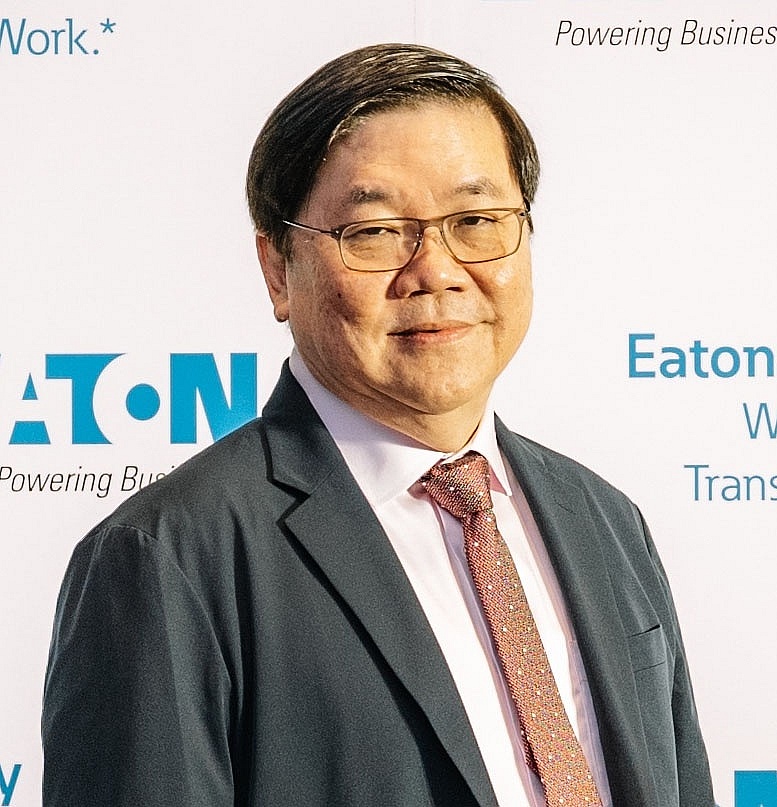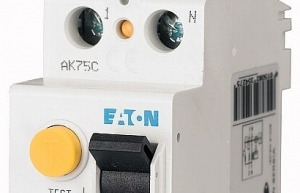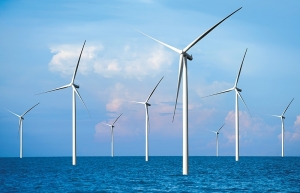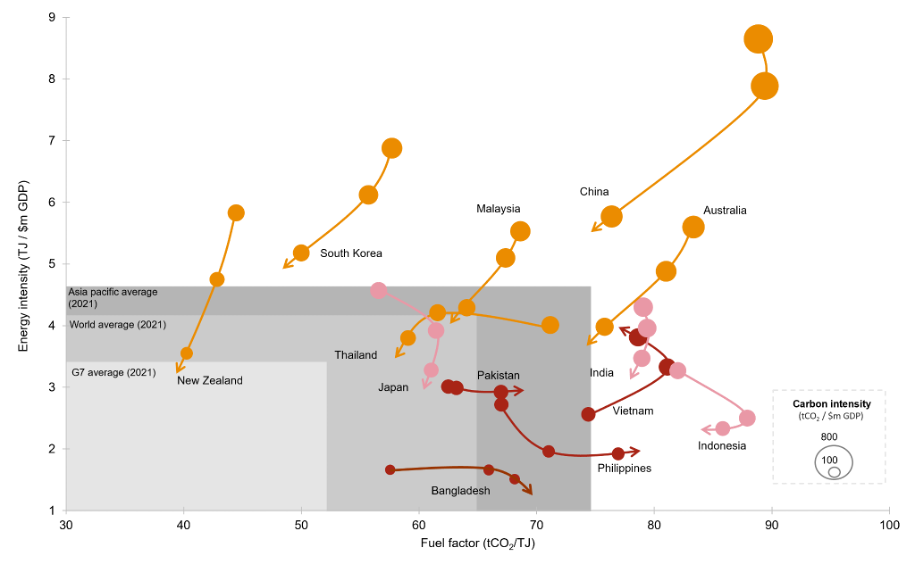Eaton contributes to Vietnam’s low-carbon economy
Eaton's “Everything as a Grid” approach adapts digital technologies to optimise and transform power management. How does this approach contribute to a low-carbon future?
 |
| Jimmy Yam, Eaton's vice president, Electrical Sector for East Asia |
We are seeing a shift in energy use everywhere in the world towards clean and renewables, including Vietnam. One example is the use of electric vehicles (EV), with producers in Vietnam like VinFast testing the water in this endeavour.
As a result, a lot of charging stations are needed. On the other hand, most utilities in every country are old and very traditional. So, the question is: how can your grid take care of these charging stations?
This is where we play a part. As people turn to solar and wind power, which is abundantly available in Vietnam, there's a need for energy storage to help stabilise the grid's frequency and ensure that the power is sustainable and continuous.
In the past, the grid supplied power to the users. But in the future, with “Everything as a Grid”, it can go both ways. That means we can sell it back to the grid if there's excess power.
So, Eaton's technology and solutions are about intelligently monitoring the connection between power sources and changing how energy is distributed and managed.
What are some of Eaton’s low-carbon projects?
Eaton has implemented several green projects around the world. One example is providing energy storage for the Catholic University of Lille, France. Specifically, this solution increases their consumption of self-generated renewable power that is reliable and adaptable to their needs.
Another project is to dynamically control distributed energy sources through a microgrid to help our Wadeville manufacturing plant in South Africa reduce downtime and energy costs by 50 per cent.
Monetising previously under-used backup power assets allows our data centre customers to participate in grid frequency response, sell power, and lower energy costs.
Eaton is also stepping up its commitment to improving environmental quality through our specific 2030 targets: reducing carbon emissions from our operations by half, lowering our product and supply chain emissions, certifying all manufacturing sites as zero waste to landfill, and achieving carbon-neutral operations by 2030.
What is the company's investment focus in Vietnam going forward?
Vietnam is a critical market for us. The country registered one of the highest growths in GDP in Asia, with a young and dynamic population.
We would like to see how we can participate and look at how we can cooperate with some industries to contribute our solutions more effectively.
So far, Eaton has cooperated with many customers in Vietnam to build large data centres. Going forward, data centres will be one of our key development segments. But in the face of economic growth and energy development, we hope to bring even more solutions in the power distribution and system management field.
We are actively hiring and aim to grow staff numbers by 50 per cent compared to the previous pandemic years. In terms of partners and alliances, we are looking to find ways to a number of growing Vietnamese companies.
Eaton has the technology and the know-how, but we need local partners who understand the country well, so they can find ways to efficiently benefit Vietnamese consumers. At the end of the day, it's not just about doing business. We want to focus more on knowledge transfer and long-term development.
Can you dive deeper into your plans to develop data centres in Vietnam?
Eaton globally is a major supplier of data centre solutions. Data centres have been growing rapidly over the last four to five years. Eaton was the first company in Asia-Pacific to introduce lithium batteries in data centres, with the first being in Singapore about five years ago – and now all data centres are using lithium batteries. That is to say that we are always at the forefront of introducing new technology into data centres.
Over the years, they have been two different groups of data centre players. Mega players from the US, like Equinix, Facebook, and Google, have invested a lot in this market. But recently, I also see a lot of regional data centre companies, from Singapore or China, coming into the Asia Pacific, and I think Vietnam probably will benefit from this.
As many global customers or regional data centres are looking in Vietnam, we come with them and assist in designing sustainable data sets and solutions. We see a big potential in the data centre market in Vietnam and are determined to strengthen our ability to support these data centres.
| Eaton is an intelligent power management company dedicated to improving the quality of life and protecting the environment for people everywhere. The company is guided by the commitment to do business right, operate sustainably and help our customers manage power – today and well into the future. By capitalising on the global growth trends of electrification and digitalisation, Eaton is accelerating the planet’s transition to renewable energy, helping to solve the world’s most urgent power management challenges, and doing what’s best for stakeholders and society. Founded in 1911, Eaton has been listed on the NYSE for nearly a century. Eaton reported revenues of $19.6 billion in 2021 and serves customers in more than 170 countries. |
 | Eaton expands distribution network in Vietnam with reliable power solutions Shanghai-based Eaton, a global power management company, today signed four new partnership agreements for the distribution of its Circuit Protection and Control (CPC) and Power Distribution (PD) products in the Vietnamese market. |
 | Conditions in place for offshore development Reducing the cost of capital for offshore wind power projects in Vietnam will be the main driver for lowering electricity costs and encouraging investment in such projects, argue several international energy experts, with the right government policies needed to be implemented quickly to follow through with the country’s energy development schedule. |
 | Proposals to promote Vietnam's energy transition The energy elasticity coefficient in Vietnam for the 2016-2020 period averaged 1.67, a relatively high figure compared to some other countries that could prompt the need for more drastic remedy measures. |
 | Asia-Pacific outperforms global decarbonisation in 2021 The Asia-Pacific region outperformed its global counterparts in 2021 with a decarbonisation rate of 1.2 per cent versus 0.5 per cent elsewhere, as stated in a newly-released PwC report that highlights the efforts to decouple greenhouse gas emissions from economic growth despite the global headwinds. |
What the stars mean:
★ Poor ★ ★ Promising ★★★ Good ★★★★ Very good ★★★★★ Exceptional
Related Contents
Latest News
More News
- Efficient technology solutions key factors in energy transition (September 25, 2024 | 09:00)
- Sao Do Group gears towards energy savings (December 07, 2023 | 12:01)
- Vice President Vo Thi Anh Xuan visits Copenhagen Infrastructure Partners headquarters (November 23, 2023 | 10:37)
- A wind turbine tower collapses in China (November 20, 2023 | 19:36)
- Vietnam has massive potential for offshore wind energy (March 17, 2023 | 16:29)
- Rooftop solar event entices EPC contractors and investment funds (March 09, 2023 | 07:50)
- GreenYellow acquires 49.5MWp solar farm of French IPP Qair in Vietnam (November 25, 2022 | 08:00)
- Proposals to promote Vietnam's energy transition (November 12, 2022 | 22:02)
- How intelligent lights make cities smarter, safer and greener (November 04, 2022 | 09:00)
- ACCV’s first battery storage project with Motul in Vietnam (October 10, 2022 | 12:23)

 Tag:
Tag:




















 Mobile Version
Mobile Version